Food features central in any holiday season, in every one’s culture.
For Thanksgiving in the United States, food plays a huge role in the history/legend of the holiday’s origins, along with the present-day celebration of the festival.
At the same time, in and beyond the U.S., families’ finances will also be playing a central role in dinner-table conversations, shopping on the so-called “Black Friday” retail season (which has extended long before Friday 25th November), and in what’s actually served up on those tables.
Let’s connect some dots today on food, finance and health as we enter the holiday season many people will be sharing this and in the coming weeks.
Financial security, health and food were featured in a YouGov poll in April 2022 which can inform our understanding of the relationship between these factors in everyday peoples’ lives. https://business.yougov.com/content/42271-global-financial-security-and-health
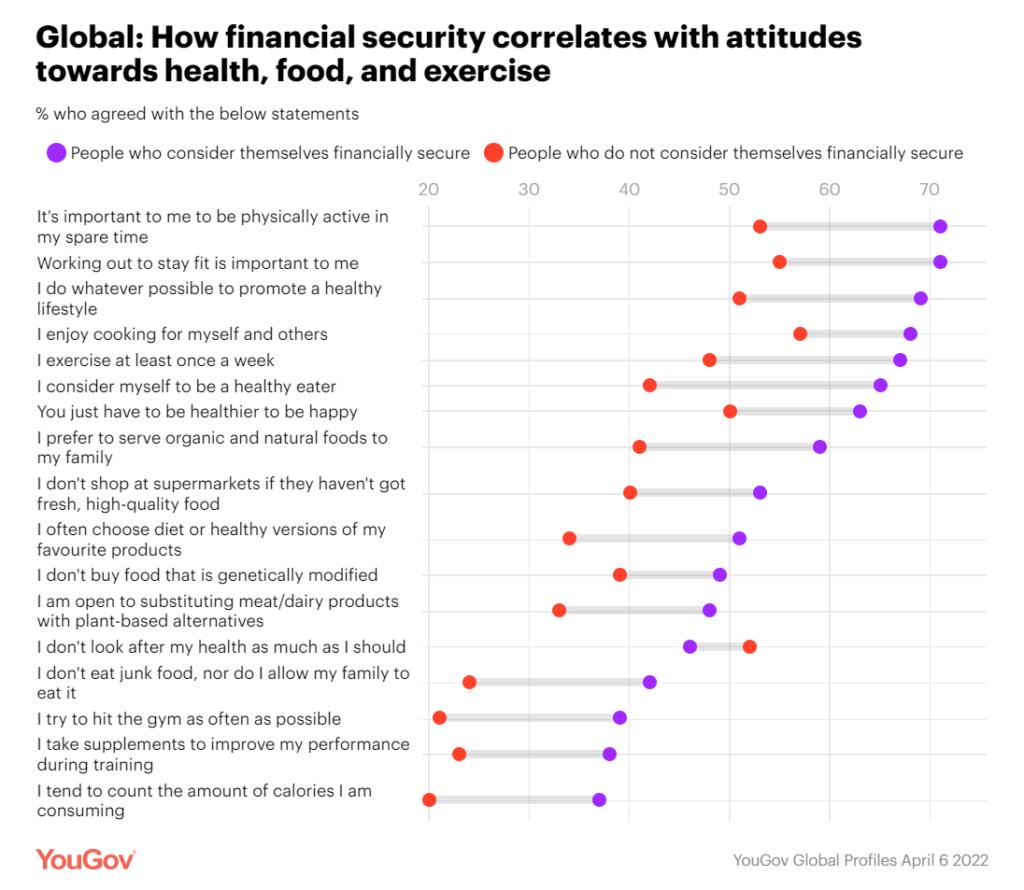
The graph clearly illustrates the relationship between peoples’ perceptions of financial security and various life-flows relating to healthy living. In all behaviors but one — “I don’t look after my health as much as I should” — many more people who consider themselves financially secure undertake health-related actions than folks who do not feel financially secure.
The level of health engagement is among financially-secure consumers who:
- Consider it important o be physically active in their spare time
- Work out to stay fit as being important
- Do whatever is possible to promote a healthy lifestyle
- Enjoy cooking for themselves and for others
- Exercise at least once a week
- Consider themselves to be healthy eaters
- Believe “you just have to be healthier to be happy”
- Prefer to serve organic and natural foods to their families
- Don’t shop at supermarkets if they do not have fresh, high-quality food
- Often choose diet or healthy versions of their favorite products, and
- Are open to substitute meat/dairy products with plant-based alternatives.
At the opposite end of the health engagement spectrum, people who do not consider themselves financially secure have very little likelihood of counting the amount of calories they consume, take supplements to improve their performance during training, try to hit the gym as often as possible, and avoid junk food, nor prevent their family from consuming junk food.
“The peculiar evil is this: the less money you have, the less inclined you feel to spend it on wholesome food,” George Orwell wrote in The Road to Wigan Pier, the literate YouGov analysts cited.
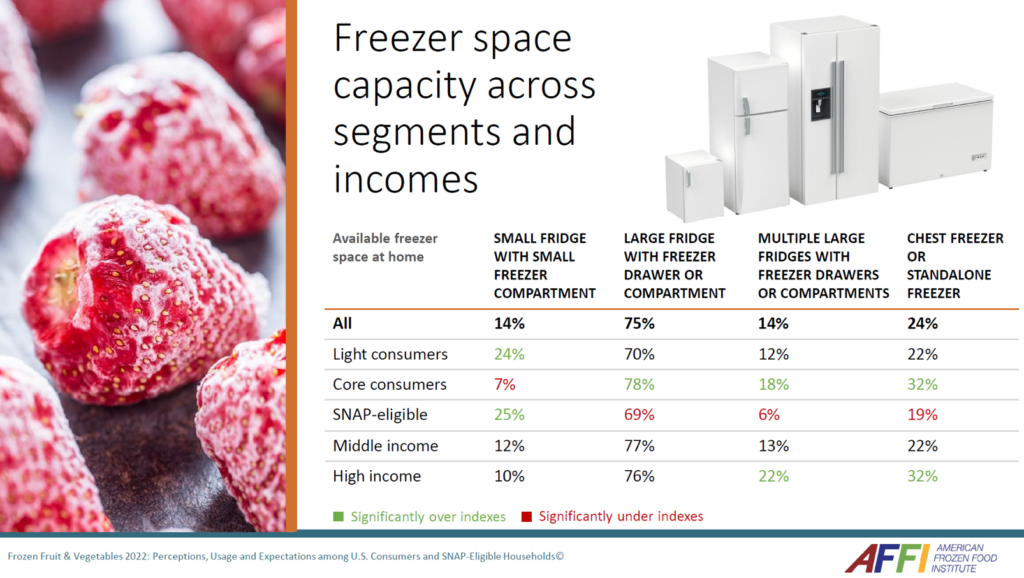
Health Populi’s Hot Points: Frozen fruit and vegetables (FF&V) are important and convenient sources of nutritious foods for people to have on-hand for home cooking with a focus on healthy eating.
That is, if you have freezer capacity in which you can store frozen foods.
The American Frozen Foods Institute published a study on FF&V in 2022, looking into consumers’ usage and expectations by peoples’ household income and SNAP eligibility. [FYI for those who do not know the “SNAP” acronym, it stands for Supplemental Nutrition Assistance Program, the food support benefit sponsored by the U.S.
In the wake of the pandemic, more FF&V consumers expanded their at-home freezer capacity — one of many retail data points we can cite that demonstrate people pivoting their homes as health hubs for more cooking from scratch or well-being at home.
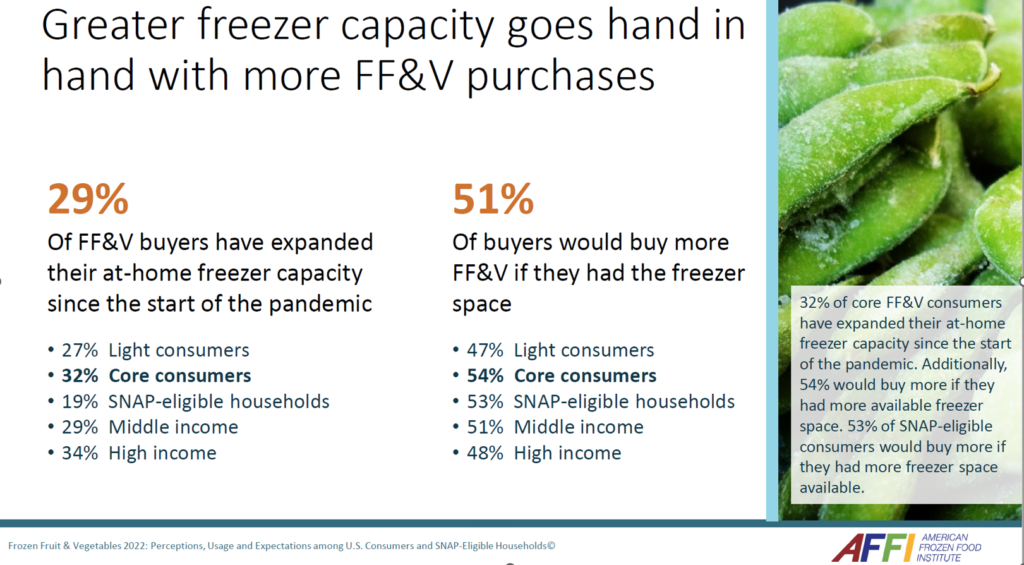
Greater freezer capacity goes hand-in-hand with more purchases of frozen fruits and veg, AFFI found in its study: over one-half of both “core” FF&V consumers as well as people in SNAP-eligible households would buy more frozen produce if they had the freezer space. But while 32% of core FF&V buyers expanded their freezer space since the beginning of the COVID-19 pandemic, only 19% of people in SNAP-eligible homes did so.
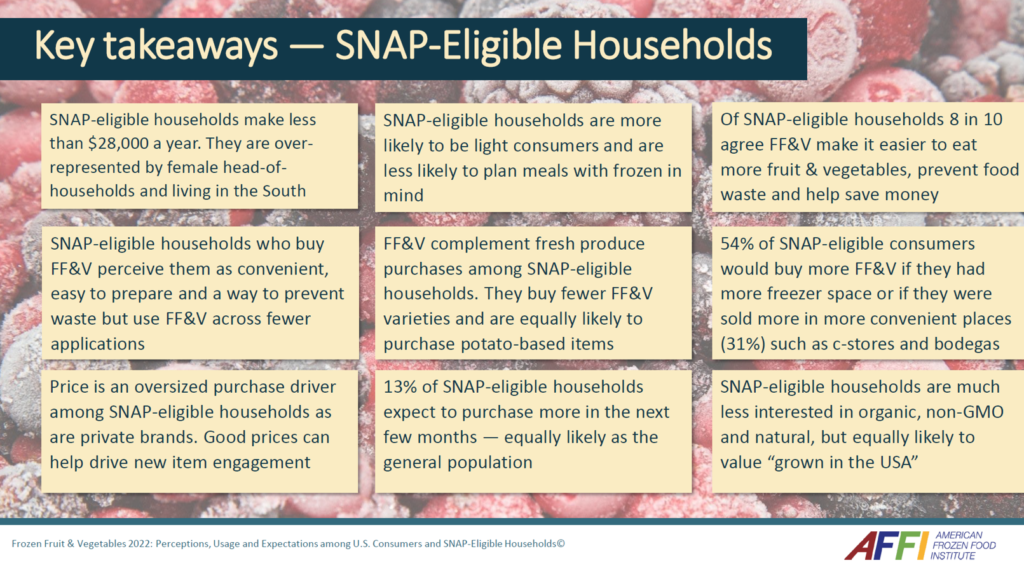
Note that, compared with consumers in middle- and high-income homes, fewer people in SNAP-eligible households look for nutritional value claims, health benefit claims, or for products with no artificial ingredients such as sweeteners.
The gap in seeking health benefit claims is especially wide between all consumers on average (42%) and folks in SNAP-eligible homes. AFFI found several other gaps between folks in SNAP-eligible households and consumers with higher incomes related to seeking organic products, minimally processed food, and the search for “natural.”
With the YouGov and AFFI data in mind, there’s a key connection to make in our inventory of drivers of health factors (aka social determinants of health, or #SDoH) — that having a refrigerator with freezer capacity is important for being able to store frozen foods that can help “health-ify” a family’s nutrition at home. I’ve raised this issue to managed markets teams in pharma and med-tech company meetings for a long time — whether they collaborate, or even meet with, States’ SNAP benefits administrators. Health and food/nutrition are so intimately linked; even the “best” prescribed therapy won’t optimally perform for great patient outcomes if said patient lacks a fridge or freezer with healthy food as part of their daily life.
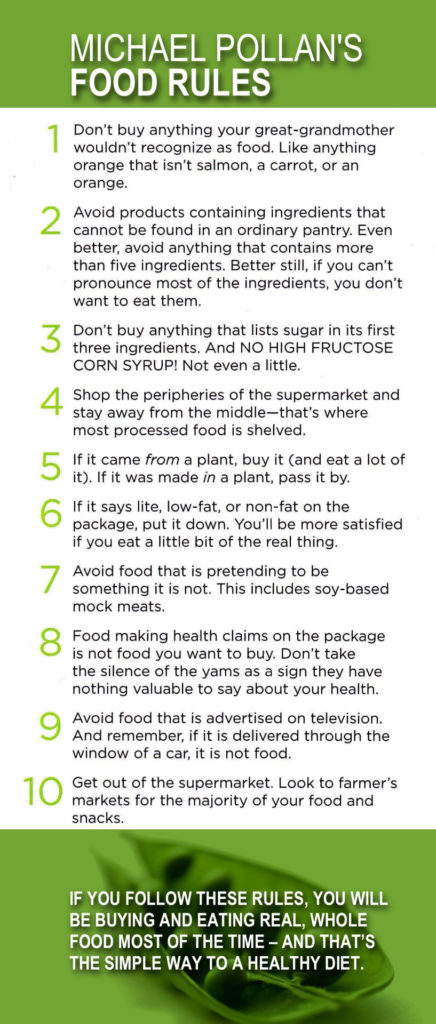
On a personal note…I’ve been working in London this week on the days leading up to Thursday the 24th, Thanksgiving Day in the U.S. That evening, I’ll be going to celebrate dinner with friends (a mix of Brits and Americans) in a restaurant. We have been forewarned that turkeys are in short-supply in the UK given dramatically high levels of the avian flu negatively impacting the supply of the traditional bird eaten this season and in many families’ ritual tables, over Christmas.
While I might miss my turkey, I feel incredibly grateful in this moment to be able to share these thoughts on food and health and families in the Health Populi blog, and do the work that I do to bolster thinking and acting on better health for all health citizens. I wish you all a healthy, joyful, and peaceful Thanksgiving and holiday season…
Be well….and take a page from Michael Pollan’s Food Rules….key takeaways shown here.
The MP mantra is to
Eat food…not too much…mostly plants.
Well, it’s the holidays….so you can break the rules a little!
But given that it’s Thanksgiving, I think rule #1 — to avoid buying foods that your great-grandmother would not recognize as “food” — suits the holiday just right.


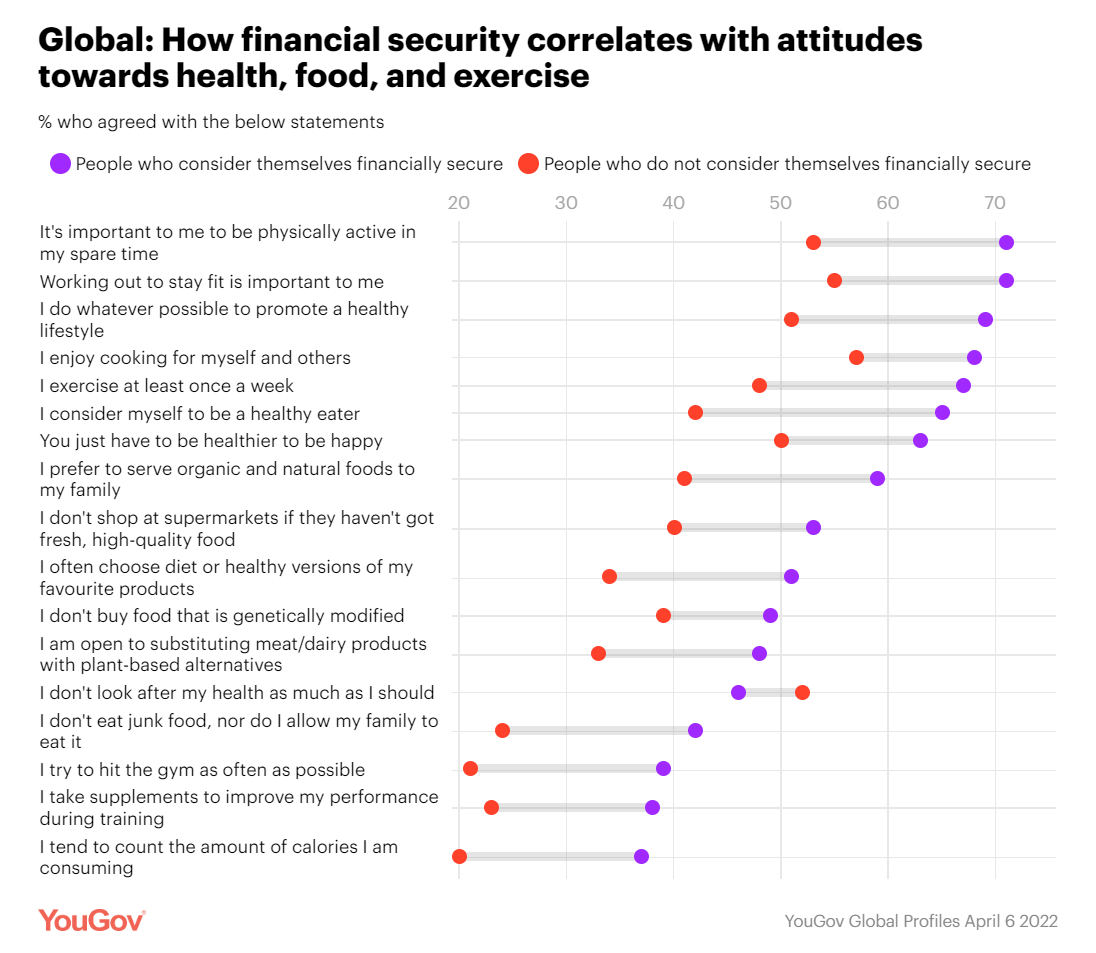


 Interviewed live on BNN Bloomberg (Canada) on the market for GLP-1 drugs for weight loss and their impact on both the health care system and consumer goods and services -- notably, food, nutrition, retail health, gyms, and other sectors.
Interviewed live on BNN Bloomberg (Canada) on the market for GLP-1 drugs for weight loss and their impact on both the health care system and consumer goods and services -- notably, food, nutrition, retail health, gyms, and other sectors. Thank you, Feedspot, for
Thank you, Feedspot, for  As you may know, I have been splitting work- and living-time between the U.S. and the E.U., most recently living in and working from Brussels. In the month of September 2024, I'll be splitting time between London and other parts of the U.K., and Italy where I'll be working with clients on consumer health, self-care and home care focused on food-as-medicine, digital health, business and scenario planning for the future...
As you may know, I have been splitting work- and living-time between the U.S. and the E.U., most recently living in and working from Brussels. In the month of September 2024, I'll be splitting time between London and other parts of the U.K., and Italy where I'll be working with clients on consumer health, self-care and home care focused on food-as-medicine, digital health, business and scenario planning for the future...